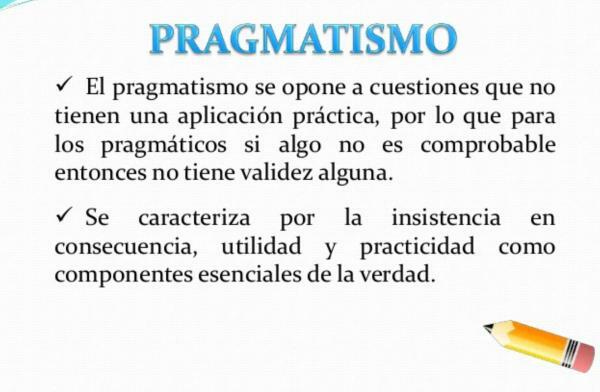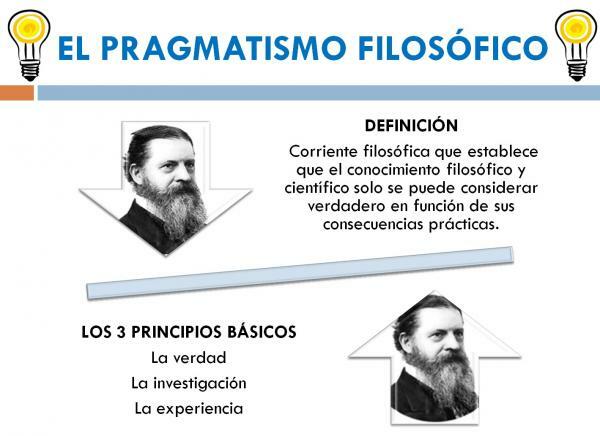16 characteristics of philosophical PRAGMATISM most outstanding

In today's lesson we are going to talk about characteristics of philosophical pragmatism, a current that was born in the 19th century, in the United States and from the hand of Charles Sanders Pierce. According to this, philosophical and scientific knowledge can only be considered true based on its practical consequences, that is, that theory and practice are intimately linked, since, the theory is extracted from the practice. Likewise, this philosophical system became the mainstream during the 20th century. (neopragmatism) and expanded to other disciplines such as law, economics, politics or sociology.
If you want to know more about philosophical pragmatism and its characteristics, we encourage you to continue reading this article and discover it. The class begins!
Index
- What is philosophical pragmatism?
- What are the characteristics of philosophical pragmatism
- What does pragmatism propose? Basic principles
What is philosophical pragmatism?
Before commenting on what are the characteristics of this philosophical current, we must first explain what pragmatism is.
Thus, the first thing we must do is analyze the etymology of the word itself and, what we have, is that pragmatism has its origin in the Greek word pragma = practice or matter, which, later, derived to the English term pragmatism. A term coined by Charles Sanders Pierce (1839-194), father of pragmatism, in a writing of 1870 and that he defined as: a method to resolve conceptual confusion, relating the meaning of any concept to a concept of the conceivable practical consequences of the effects of the conceivable thing. As Pierce would say:
“Consider the practical effects of the objects of your conception. Then, your conception of the object ".
In other words, pragmatism It is the philosophical current that establishes that philosophical and scientific knowledge can only be considered true based on its conpractical sequences. Hence, from pragmatism it is affirmed that theory is always obtained through practice (= intelligent practice) and that the only valid knowledge is that which has a practical utility.

What are the characteristics of philosophical pragmatism.
The main features of philosophical pragmatism are:
- Only that which has a practical value is true and what is true is reduced to what is useful: for pragmatism the maximum value is the practical value and usefulness of things.
- The value of things is defined according to their consequences and according to the success they have in practice = utility.
- The main function of philosophy is to generate or create practical and useful knowledge. Likewise, philosophy is interpretive and must be subject to correction and criticism (Fabilism).
- True knowledge is found in what has practical value for the course of our lives.
- Discard absolute truths: ideas are not fixed or immovable, they evolve and are subject to change.
- It is anti-fundamentalist: it denies the search for absolute truth or ultimate certainty and, therefore, also denies those doctrines that are based on absolute truth, whether religious or religious. laic.
- Reason does not stand as the only tool to obtain truth and knowledge. Thus from this stream refuses rationalism and formalism.
- The pragmatic person is characterized by being practical (valuing the benefits and functions of things), by valuing the consequences of his actions, for leaving emotions aside and for focusing on obtaining the objectives that he sets.
- The individual is a being of a social nature and there is a diversity of perspectives and traditions. Which must be respected and addressed from dialogue and democracy.
- Theory and practice are intimately linked: theory is drawn from practice.
- Another characteristic of philosophical pragmatism is that the tool to judge is the truth.
- The investigation depends on the real doubt, not on the mere verbal doubt.
- Action / practice is privileged over doctrine, experience over principles.
- It is applicable to other disciplines such as economics, law, politics, sociology or education.
- It opposes everything that does not have a useful application.
- Pragmatism is influenced by Darwinian theory, English utilitarianism, empiricism, Fabilism, Relativity and Verificationism.
And with this, we finish the list of the most prominent and defining characteristics of philosophical pragmatism of the philosophical current.

What does pragmatism propose? Basic principles.
The main basic principles of pragmatism are three.
The truth
We must stop paying attention to the absolute truth or the nature of phenomena and focus more on practical results and generate the necessary tools to obtain these results. That is, thought is valid when it is useful for our ways of life and needs.
In this way, thought is determined in terms of use and is valid when it is useful for our ways of thinking. life or needs and, therefore, the function of science and philosophy is to detect and satisfy those needs. A) Yes, an idea exists as long as it is useful to us (ways of life and needs).
The investigation
Epistemological concerns should focus on generating Research Methods and not in how knowledge is acquired. Thus, research should not be something individual, but communal, self-critical / corrective, it should replace the doubts, it has to invite progress, it has to be done through an experimental / empirical method and it should be destined to solve problems.
The experience
Pragmatism defines experience as the process by which the individual reaches the information (= empiricism), which gives us the necessary material for us to generate knowledge, as long as we are connected with the outside world and experiment. In this way, experimentation is key to building our thinking and making us an active agent.

If you want to read more articles similar to Characteristics of philosophical pragmatism, we recommend that you enter our category of Philosophy.
Bibliography
Sini, C. Pragmatism. Akal. 1999.


